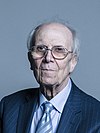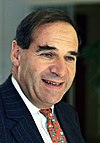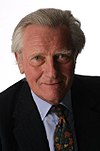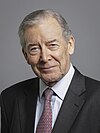Secretary of State for Business and Trade
| United Kingdom Secretary of State for Business and Trade | |
|---|---|
 | |
since 5 July 2024 | |
| Department for Business and Trade | |
| Style |
|
| Status | Secretary of State Minister of the Crown |
| Member of | Cabinet Privy Council Board of Trade |
| Reports to | The Prime Minister |
| Appointer | The Monarch (on the advice of the Prime Minister) |
| Formation |
|
| First holder | Edward Heath (as Secretary of State for Industry, Trade and Regional Development) |
| Salary | £159,038 per annum (2022)[1] (including £86,584 MP salary)[2] |
| Website | Department for Business and Trade |
| This article is part of a series on |
| Politics of the United Kingdom |
|---|
 |
|
|
The secretary of state for business and trade (business secretary), is a secretary of state in the Government of the United Kingdom, with responsibility for the Department for Business and Trade. The incumbent is a member of the Cabinet of the United Kingdom.
The incumbent business secretary is Jonathan Reynolds who was appointed by Keir Starmer on 5 July 2024.[3] The Secretary of State is shadowed by the Shadow Secretary of State for Business and Trade, currently Andrew Griffith since 2024.
Responsibilities
Corresponding to what is generally known as a commerce minister in many other countries, the business secretary's remit includes:
- Relations with domestic and international business
- Policy relating to deregulation
- Policy relating to international trade and trade agreements
- Import and export policy
History
During the government of Sir Alec Douglas-Home, the then president of the Board of Trade, Edward Heath, was given in addition the job of secretary of state for industry, trade and regional development. This title was not continued under Harold Wilson, but when Heath became Prime Minister in 1970 he decided to merge functions of the Board of Trade and the Ministry of Technology to create the Department of Trade and Industry. The head of this department became known as the secretary of state for trade and industry and also retained the title of President of the Board of Trade.
When Harold Wilson re-entered office in March 1974, the office was split into the Department of Trade, the Department of Industry and the Department of Prices and Consumer Protection, resulting in the creation of three new positions: Secretary of State for Industry, Secretary of State for Prices and Consumer Protection, and Secretary of State for Trade. The title President of the Board of Trade became the secondary title of the Secretary of State for Trade. By 1979 the Department of Prices and Consumer Protection was abolished by the incoming Conservative government and its responsibilities were reintegrated into the Department of Trade. Furthermore, 1983 the offices of trade and industry were remerged and the title of Secretary of State for Trade and Industry was recreated. When Michael Heseltine held this office, he preferred to be known by the older title of President of the Board of Trade, and this practice was also followed by Ian Lang and Margaret Beckett. Heseltine's decision to reuse the old title caused some controversy, and it was discovered[by whom?] that the Board of Trade had not in fact met since the mid-nineteenth century.[citation needed]
Under Gordon Brown's premiership there were two re-namings of the role and three re-alignments of responsibility. In his first cabinet of 2007, he called the post Secretary of State for Business, Enterprise and Regulatory Reform. With this change, the Better Regulation Executive was added to the department but the Office of Science and Innovation was lost. In 2008, the title remained the same but responsibility for energy was lost. In 2009, the Department for Innovation, Universities and Skills was merged into the existing department and the post became Secretary of State for Business, Innovation and Skills.
In July 2016, Prime Minister Theresa May decided to merge the Department for Energy and Climate Change into this department with the responsibilities for post-19 education and skills being returned to the Department for Education resulting in the position being renamed to Secretary of State for Business, Energy and Industrial Strategy. At the same time in July 2016, the post of President of the Board of Trade was transferred to the newly created post of Secretary of State for International Trade.[4]
The current role of Secretary of State for Business and Trade was established on 7 February 2023 after a cabinet reshuffle by Prime Minister Rishi Sunak saw the dissolution of the Department for Business, Energy and Industrial Strategy and its responsibilities transferred to three new departments: Department for Business and Trade, the Department for Science, Innovation and Technology, and the Department for Energy Security and Net Zero. The new Department for Business and Trade absorbed the business policy responsibilities of BEIS, and the functions of the former Department for International Trade.
List of secretaries of state
Industry, trade and regional development (1963–1964)
| Secretary of State | Took office | Left office | Political party | Prime Minister | |||
|---|---|---|---|---|---|---|---|

|
Edward Heath MP for Bexley |
20 October 1963 | 16 October 1964 | Conservative | Alec Douglas-Home | ||
Trade and industry (1970–1974)
| Secretary of State | Took office | Left office | Political party | Prime Minister | |||
|---|---|---|---|---|---|---|---|

|
John Davies MP for Knutsford |
15 October 1970 | 5 November 1972 | Conservative | Edward Heath | ||

|
Peter Walker MP for Worcester |
5 November 1972 | 4 March 1974 | Conservative | |||
Industry-prices-trade (1974–1983)
|
Secretary of State for Industry |
Secretary of State for Trade |
Political party | Prime Minister | |||||||||||
|---|---|---|---|---|---|---|---|---|---|---|---|---|---|---|
| Name | Took office | Left office | Name | Took office | Left office | Name | Took office | Left office | ||||||
 Tony Benn MP for Bristol South East |
5 March 1974 | 10 June 1975 |  Shirley Williams MP for Hertford and Stevenage |
5 March 1974 | 10 September 1976 | Peter Shore MP for Stepney and Poplar |
5 March 1974 | 8 April 1976 | Labour | Harold Wilson | ||||
Eric Varley MP for Chesterfield |
10 June 1975 | 4 May 1979 | ||||||||||||
Edmund Dell MP for Birkenhead |
8 April 1976 | 11 November 1978 | James Callaghan | |||||||||||
 Roy Hattersley MP for Birmingham Sparkbrook |
10 September 1976 | 4 May 1979 | ||||||||||||
John Smith MP for North Lanarkshire |
11 November 1978 | 4 May 1979 | ||||||||||||
Keith Joseph MP for Leeds North East |
4 May 1979 | 14 September 1981 | Department abolished 1979. (Responsibilities transferred to the Department for Trade.) |
 John Nott MP for St Ives |
5 May 1979 | 5 January 1981 | Conservative | Margaret Thatcher | ||||||
John Biffen MP for Oswestry |
5 January 1981 | 6 April 1982 | ||||||||||||
Patrick Jenkin MP for Wanstead and Woodford |
14 September 1981 | 12 June 1983 | ||||||||||||
The Lord Cockfield |
6 April 1982 | 12 June 1983 | ||||||||||||
| Departments merged in 1983 and responsibilities transferred to the Department for Trade and Industry. | ||||||||||||||
Trade and industry (1983–2007)
- ^ a b c Primarily referred to as President of the Board of Trade, and not as Secretary of State for Trade and Industry
- ^ Alan Johnson was initially announced on 6 May 2005, after the general election, as being "Secretary of State for Productivity, Energy and Industry and President of the Board of Trade", but after just a week, on 13 May, it was declared that the new title would not be used, after widespread derision of the new name, because the abbreviation for Johnson's title, Productivity, Energy and Industry Secretary, would have been "PENIS".[5]
Business, enterprise and regulatory reform (2007–2009)
| Secretary of State | Took office | Left office | Political party | Cabinet | Prime Minister | |||
|---|---|---|---|---|---|---|---|---|

|
John Hutton MP for Barrow and Furness |
28 June 2007 | 3 October 2008 | Labour | Brown | Gordon Brown | ||
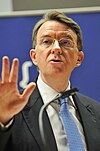
|
The Lord Mandelson | 3 October 2008 | 5 June 2009 | Labour | ||||
| Department abolished 2009. Responsibilities transferred to the Department for Business, Innovation and Skills. | ||||||||
Business, innovation and skills (2009–2016)
| Secretary of State | Took office | Left office | Political party | Cabinet | Prime Minister | |||
|---|---|---|---|---|---|---|---|---|

|
The Lord Mandelson | 5 June 2009 | 11 May 2010 | Labour | Brown | Gordon Brown | ||

|
Vince Cable MP for Twickenham |
12 May 2010 | 8 May 2015 | Liberal Democrats | Cameron-Clegg | David Cameron | ||

|
Sajid Javid MP for Bromsgrove |
11 May 2015 | 14 July 2016 | Conservative | Cameron II | |||
| Department abolished 2016. Responsibilities transferred to the Department for Business, Energy and Industrial Strategy. | ||||||||
Energy and climate change (2008–2016)
| Secretary of State | Term of office | Political party | Cabinet | Prime Minister | ||||
|---|---|---|---|---|---|---|---|---|

|
Ed Miliband MP for Doncaster North |
3 October 2008 | 11 May 2010 | Labour | Brown | Gordon Brown | ||

|
Chris Huhne MP for Eastleigh |
12 May 2010 | 3 February 2012 | Liberal Democrats | Cameron-Clegg | David Cameron | ||

|
Ed Davey MP for Kingston and Surbiton |
3 February 2012 | 8 May 2015 | Liberal Democrats | ||||

|
Amber Rudd MP for Hastings and Rye |
11 May 2015 | 14 July 2016 | Conservative | Cameron II | |||
| Department abolished 2016. Responsibilities transferred to the Department for Business, Energy and Industrial Strategy. | ||||||||
Business, energy and industrial strategy (2016–2023)
| Secretary of State | Took office | Left office | Political party | Cabinet | Prime Minister | |||
|---|---|---|---|---|---|---|---|---|

|
Greg Clark MP for Tunbridge Wells |
14 July 2016 | 24 July 2019 | Conservative | May I | Theresa May | ||
| May II | ||||||||

|
Andrea Leadsom MP for South Northamptonshire |
24 July 2019 | 13 February 2020 | Conservative | Johnson I | Boris Johnson | ||
| Johnson II | ||||||||

|
Alok Sharma MP for Reading West |
13 February 2020 | 8 January 2021 | Conservative | ||||

|
Kwasi Kwarteng MP for Spelthorne |
8 January 2021 | 6 September 2022 | Conservative | ||||

|
Jacob Rees-Mogg MP for North East Somerset |
6 September 2022 | 25 October 2022 | Conservative | Truss | Liz Truss | ||

|
Grant Shapps MP for Welwyn Hatfield |
25 October 2022 | 7 February 2023 | Conservative | Sunak | Rishi Sunak | ||
| Department abolished February 2023. Responsibilities distributed to the newly created Departments for Business and Trade, Energy Security and Net Zero, and Science, Innovation and Technology. | ||||||||
Business and trade (2023–present)
| Secretary of State | Took office | Left office | Political party | Cabinet | Prime Minister | |||
|---|---|---|---|---|---|---|---|---|
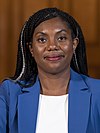
|
Kemi Badenoch MP for Saffron Walden |
7 February 2023 | 5 July 2024 | Conservative | Sunak | Rishi Sunak | ||

|
Jonathan Reynolds MP for Stalybridge and Hyde |
5 July 2024 | Incumbent | Labour | Starmer | Keir Starmer | ||
Timeline

References
- ^ "Salaries of Members of His Majesty's Government – Financial Year 2022–23" (PDF). 15 December 2022.
- ^ "Pay and expenses for MPs". parliament.uk. Retrieved 15 December 2022.
- ^ "Politics news - latest: New Tory party chair confirmed - as Rishi Sunak announces changes to top team". Sky News. Retrieved 7 February 2023.
- ^ "Secretary of State for International Trade and President of the Board of Trade". gov.uk.
- ^ "Profile: Alan Johnson". The Daily Telegraph. London. 18 June 2005.




